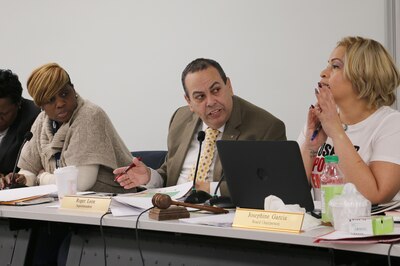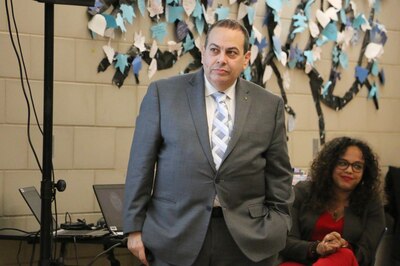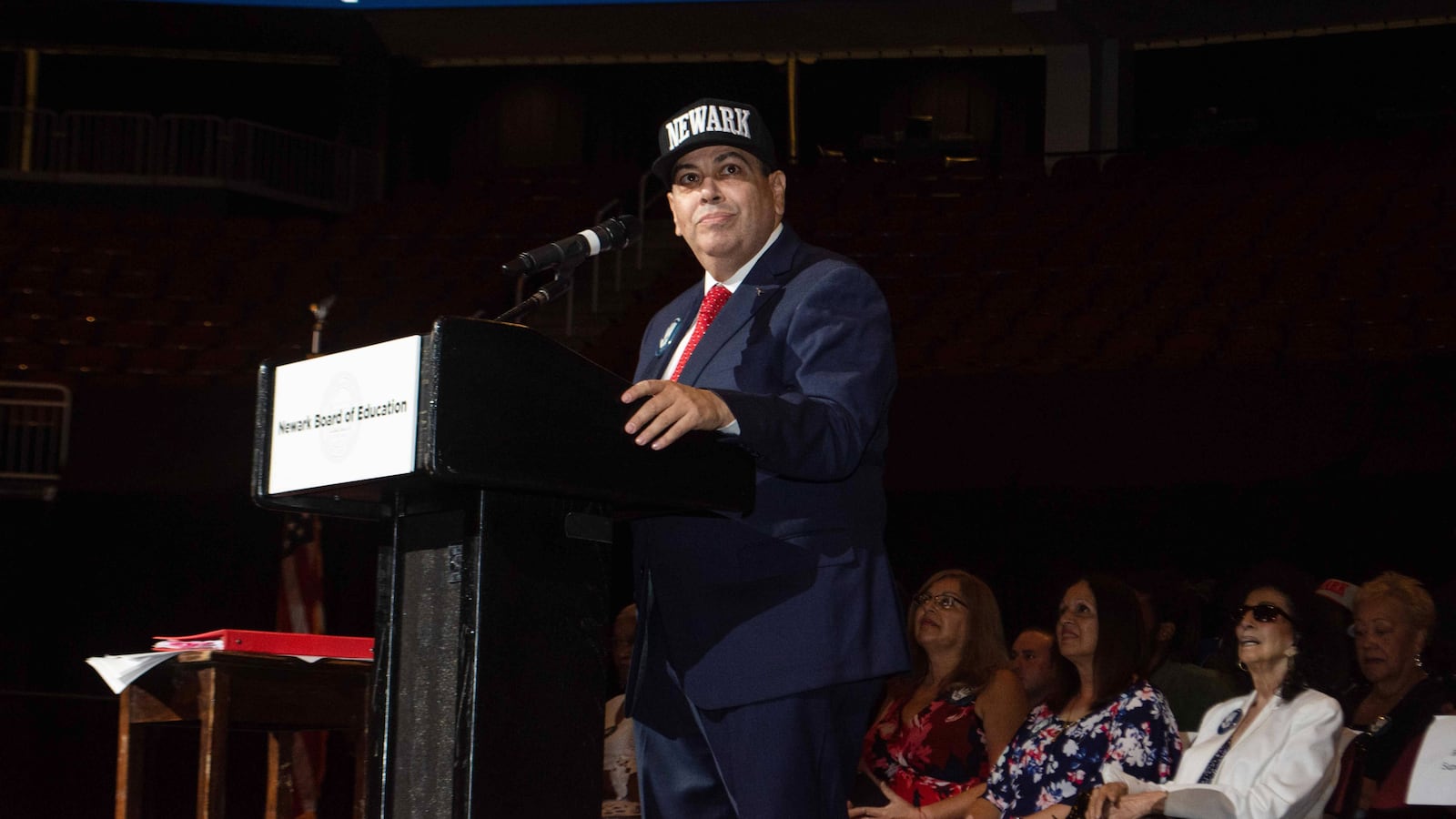Roger León had a very big year.
Last July, the Newark native became the city’s first Hispanic superintendent and, owing to the end of a prolonged state takeover, the first in over two decades to answer to the Newark school board rather than officials in Trenton. In the year since, León has met with thousands of local stakeholders, ordered audits of every facet of the 36,000-student system, and boldly promised to make the district “second to none.”
“Right now, the honeymoon is good,” said Brian Taylor, a Newark Public Schools parent and advocate. “He’s homegrown, he cares, he believes, and he’s got the trust of the people in the community.”
But honeymoons last only so long. As he passed his one-year mark Monday, León was grappling with fiscal uncertainties that he inherited from previous administrations, an expired teachers contract, and aging school buildings in need of major repairs — just to name a few of the urgent challenges.
Also on Monday, León’s master plan for the district took effect. León has said it will spark a renaissance at the city’s struggling traditional high schools and marshal the resources needed to meet students’ emotional and physical needs, as well as their academic ones. Now that Newarkers have heard León’s lofty promises and his assessments of where his predecessors went wrong, they’ll be looking for him to deliver changes.
“We’ve got to give him time,” Taylor said. But, “this time next year, it’ll be different kinds of questions being asked.”
Meet the new boss
Last August, just over a month after starting as superintendent, León wanted everyone to know that change was going to come to Newark schools — and fast.
He summoned all 6,300 or so district employees to a downtown arena, where he catalogued his credentials from a towering stage. He had been a student in Newark, a teacher, an elementary and high school principal, and an assistant superintendent, he told the crowd. Now, it was time for a “reorganization” of the system he knew so well.
In recent years, he had watched state-appointed superintendents — white outsiders in a majority black and brown city — close schools and lay off employees, even as the city’s charter schools mushroomed. The changes led to real gains in student learning, but the intervention also incited fury among Newarkers who resented the suggestion, as León’s chief of staff put it, “that we needed an army from all over the place to come in and fix us.”
Those days were now over. To roaring applause, León told his audience that he had forced out more than 30 central-office workers connected to his predecessors. His strategy, he said, would be to grow the district, not downsize it. He would give educators all the support they needed to improve student achievement, without relying on specialists with little classroom experience — “chief of strategy, chief of talent, chief of data.” The only chief “in this house,” he said, would be his chief of staff, a former teacher in the schools where León was principal.
With León at the helm, the state’s largest district was back under local control, governed by a man who knows the city and its schools intimately — and has strong ideas about where to take them.
“I’m not the chief,” León said, his face beaming down from the arena’s Jumbotron. “I’m the boss.”

Undoubtedly, some of León’s boasting was a form of vindication. The Newark school board had picked him as superintendent years earlier, yet the state installed Christopher Cerf — a former New York City schools official and New Jersey education commissioner — instead. But León’s swagger was also strategic, a way of embodying renewed pride in the city’s schools.
Former Superintendent Cami Anderson, who previously worked alongside Cerf in New York, had portrayed the Newark school system as fundamentally broken and in desperate need of an overhaul — which she attempted with the backing of then-Mayor Cory Booker and Facebook founder Mark Zuckerberg. By contrast, León talks about a district “poised for greatness,” with all the talented students and educators necessary to reach new heights.
“It’s a breath of fresh air,” said Isabel Sousa, an Arts High School teacher, at the August convention.
León began his tenure with an ambitious listening tour, an effort to build consensus for his agenda rather than impose it from above. He sat down with students and college presidents, community activists and union leaders, and held breakfast meet-and-greets with parents. He showcased his fierce pride and protectiveness of Newark, often calling students “babies” and promising to restore the names of schools that had been changed under state control.
“It’s disrespect,” he said at a budget hearing about such tampering with the city’s history, “and we’re not allowing that, in whatever shade.”
But if anyone thought León planned simply to celebrate the system’s strengths, and overlook any deficits, he quickly disabused them of that notion. At the August convention, he called out schools with the lowest test scores by name. In later meetings, he called the student achievement data “ugly” and “atrocious,” and the curriculum used by many schools “horrible.”
Despite the recent academic progress in Newark, León suggested that many of his predecessors’ policies had failed. He mocked Anderson’s “Attend Today, Achieve Tomorrow” attendance campaign. “You can see they don’t attend today, so they don’t achieve tomorrow,” he said in August. Later, he declared that her and Cerf’s efforts to give principals more authority had backfired: “This whole autonomy concept went buckwild,” he said.
His solution has been to impose new mandates meant to create consistency across schools, and to tell everyone — from students and parents to teachers and central-office staff — that he expects to see results. “It’s all about accountability,” he said at an August school board meeting.
In some ways, his no-excuses style is not so different from his recent predecessors. But whereas their message could sound shaming or condescending coming from outsiders, it’s accepted as tough love when delivered by a lifelong Newarker — the son of Cuban immigrants, León still lives in the same neighborhood where he grew up and went to school.
“Roger is known to the district,” said Nitia Preston, who was the parent liaison at Peshine Avenue School before deciding to leave at the end of this school year. She said she appreciated León’s demanding approach, which she said spurred her colleagues to up their game.
“People were basically saying, ‘Get your stuff together,’” Preston said. “Because Roger is not playing.”
Echoes of the past
With a quarter-century of experience working in the district, León started as superintendent with firm convictions about which policies worked — and which didn’t.
Just as the school year was starting, León began to eliminate those he deemed failures. He ended a program that gave struggling schools longer days, forcing the schools to quickly adjust their hours and bus schedules. He discontinued an online math curriculum, leaving some high schools to use years-old textbooks while the district sought replacements. And after personally reviewing hundreds of student transcripts, he mandated changes to the way high school courses are scheduled. For instance, he ordered schools to split up block schedules that offered extra-long periods of English and math, requiring schools to revamp students’ course loads mid-year.
Even when educators agreed that certain policies were flawed, some felt the changes were rushed and imposed with little warning — a disruptive approach that had galled Newarkers when adopted by Anderson.
León “doesn’t seem to think through the human cost of these decisions,” said a high school teacher who left the district in October, speaking on the condition of anonymity to avoid retaliation. “All of those changes led to me leaving — I had a full-on breakdown.”

At the same time, León moved to restore past practices that his predecessors had abandoned. He began to reboot vocational programs that high schools had in the early 2000s and rehire attendance workers who were laid off six years ago. He revived a reading program the district used when he was principal, and brought back a requirement that students take an entrance exam if they want to attend one of the city’s elite magnet schools.
Many district veterans cheered the moves, believing that past superintendents had discarded the policies before giving them a chance to succeed. But the approach has also left León open to the charge that he is simply resurrecting pet programs without evidence of their success.
“Some people will assume we’ll just do something from the past that didn’t work,” he said during a state hearing in June. In fact, he said, “What we’re doing is taking something that worked. We’re saying, ‘We learned over the years what were some issues,’ and we’re kind of upgrading it.”
But, to the surprise of some observers, León has embraced a more recent policy: school choice. Both Anderson and Cerf had endorsed the growth of Newark’s charter schools, whose enrollment more than tripled over the past decade. Charter critics, who accused the previous superintendents of trying to shrink or even privatize the traditional school district, expected León to take a tougher stance on charters.
Instead, he has praised the work of some charter school networks and sent district employees to be trained by them. More significantly, he convinced the school board to retain an online enrollment system that allows families to apply to charter and traditional schools in one place — despite calls by community activists and some board members to dismantle the system, which they say funnels students into the charter sector.
“There were people warning me that he would be terrible for charter schools — and that has not been the case,” said Kyle Rosenkrans, a former charter school official who heads a new group promoting district-charter cooperation. “He’s been a willing collaborator and an open-minded, pragmatic, enthusiastic partner. In that sense, he defied the expectations that many had of him.”
Long road ahead
For most of the school year, few people were privy to León’s full agenda. ”He articulates his plan from his head,” a former board member said in November.
Last month, he unveiled a district roadmap for all to see. The plan for next school year touches on nearly every aspect of the school system — from teacher training to student support services to school budgets and buildings. The plan “will help us change the course of history,” León wrote in a newsletter to families.
Yet the document provides scant details about the dozens of new initiatives it lists — a point made even by people who support the superintendent’s vision.
“The overall premise is a good one,” said John Abeigon, president of the Newark Teachers Union. “We’re still waiting to see more details on how it’s going to be effectuated.”

The plan also does not include student achievement goals for next year, making it hard to judge if his program is a success even by its own lights. Officials said such goals will be included in a 10-year plan to be released in June 2020.
Some Newark residents do not want to wait that long to know if León’s reforms are working or to see improvements.
Kanileah Anderson commended León for inviting parents like her to offer suggestions for his district plan. Yet her daughter still had a permanent substitute for most of the school year, and the high school Anderson applied to for the fall said it does not offer the special-education services her child needs.
“I was able to talk to them,” Anderson said of officials in León’s administration. “But I still don’t think anything changed.”
León also has other pressing matters to attend to. He must reach a deal with the teachers union to replace the contract that expired last month. And he must find funds to upgrade the district’s aging infrastructure. Last week, the Newark NAACP sent León a letter requesting that school buildings in disrepair receive any urgent upgrades — including to air conditioners, lights, and bathrooms — before classes resume in September.
At a meeting in Trenton last month where León presented his plan, members of the state board of education praised León’s vision and his efforts to improve student attendance, which appear to be bearing fruit. But they also pressed him for details about his plan, called Clarity 2020. “There’s no good way to say this,” one board member said, “I’m confused on Clarity.”
Another member, Ronald Butcher, said he was “very, very encouraged” by León’s presentation, which included a graph of Newark students’ test scores. But he left León with a challenge.
“Come back to us next year,” Butcher said, “and demonstrate that what you did made a difference in that graph.”


